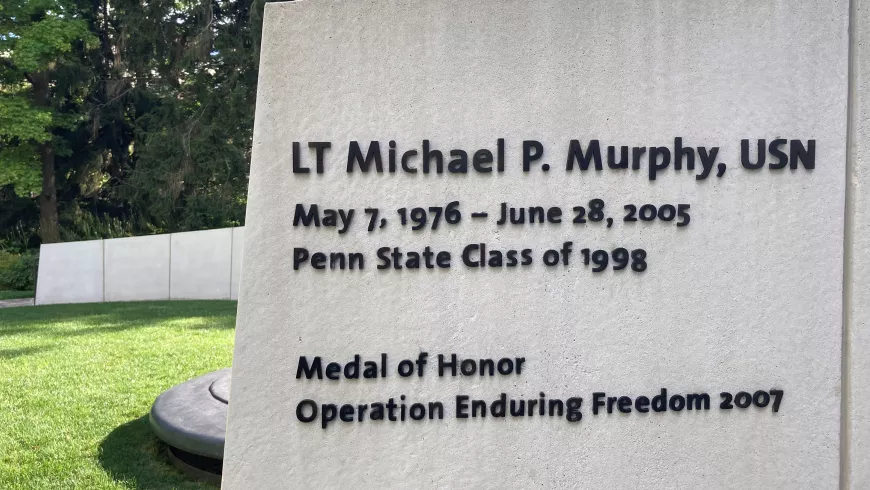100% Online
Complete your Penn State course work at your own pace and 100% online.
Application deadline
Credits and costs
10-Week Terms
Finish your program faster with accelerated 10-week terms.
Gain Intelligence and Geospatial Skills to Excel as an Analyst
Improve decision-making using space-time thinking, knowledge of human and physical geography, critical thinking, problem-solving techniques, and geographic information technologies.
Identify and assess potential security and intelligence threats, vulnerabilities, and consequences within a geospatial context using analytical skills.
Evaluate scientific evidence and best practices to understand how criminals and terrorists behave spatially, and improve real-world decisions.
Apply leadership skills and principles to produce and act on information in a collaborative setting.
Communicate the major issues of your discipline effectively to a diverse group.
Online Intelligence and Geospatial Analysis Master’s Degree Courses
Online Intelligence and Geospatial Analysis Master’s Degree Courses
This program is designed to increase your analytic skills and knowledge to produce accurate intelligence to help save lives, improve government, and assist businesses.
Intelligence is applied in law enforcement, homeland security, emergency management, and business applications, in such ways as:
- investigating organized crime and serial criminal activity
- anticipating and preventing terrorist activities
- detecting and assessing threats from criminal and terrorist groups
- preparing for and responding to emergencies and disasters
- gaining a geographic advantage over an adversary
- securing critical infrastructure and key resources
While the three core courses will offer you a solid foundation in homeland security theory and implementation, the bulk of your course work will focus on developing the expertise and career-ready skills you need to improve the intelligence reports that inform mission-critical decisions.
All students will be enrolled in the HLS Orientation (noncredit) course, as this orientation provides an overview of the HLS program and the field of homeland security.
Required Courses (9 credits)
- 3credits
Foundation for understanding homeland security history, the development of homeland security policies and organizations, and current management approaches.
- 3credits
This course will examine the social, political, legal, and ethical issues that arise in the context of homeland security.
- 3credits
Provides an overview of the domestic and global issues related to homeland security.
Intelligence and Geospatial Analysis Option Prescribed Courses (12 credits)
- 3credits
Examines the nexus of geospatial intelligence analysis with cyberspace, the geopolitics of cyber threats, the politics of censorship and hacking, public safety, disaster response, and humanitarian relief; students will utilize a range of cyber data, systems, and spatial sciences to examine human social networks of the internet.
- Prerequisite
GEOG 160 or GEOG 482 or permission of program
- 3credits
How geographic information systems facilitate data analysis and communication to address common geographic problems.
- Prerequisite
GEOG 482 or permission of the program
- 3credits
Orientation to the geographic foundations of geospatial intelligence and its applications in national security, international relief work, and disaster management.
- 3credits
Focuses on the science and technology of human-machine collaboration using geospatial artificial intelligence (GeoAI) in GEOINT and the professional and ethical concerns that must be considered in this rapidly evolving field.
- Prerequisite
GEOG 882
Electives (select 9 credits)
All students are required to take at least one elective that is a 500-level course in addition to the Capstone Experience (GEOG 594) to satisfy the degree requirement of 6 credits at the 500 level.
- 3credits
This course will explore intentional and unintentional threats to the agriculture food system, history, and current approaches for safeguarding this key infrastructure.
- 3credits
This seminar provides students with a comprehensive understanding of the multifaceted nature of disaster communication across phases of a disaster.
- 3credits
Using imagery and terrain data in typical application scenarios faced by the geospatial professional.
- 3credits
Understanding lidar systems; design, operation, data processing techniques, and product generation to address typical application scenarios faced by the geospatial professional.
- 3credits
Case studies, student investigations, and projects reveal the scope, impact, and character of the Geospatial Revolution.
- 3credits
Database design, creation, maintenance, and data integration using desktop GIS software.
- Prerequisite
GEOG 483 or permission of the program
- 3credits
Customizing GIS software to extend its built-in functionality and to automate repetitive tasks.
- Prerequisite
GEOG 484 or permission of the program
- 3credits
Theory and practice of cartographic design, emphasizing effective visual thinking and visual communication with geographic information systems. Technologies: ArcGIS Pro, Mapbox Studio, QGIS
- Prerequisite
GEOG 484 or permission of the program
- 3credits
Real-world applications of GIS and spatial analysis to investigate a variety of current environmental issues.
- 3credits
Learn advanced applications of Python for developing and customizing GIS software, designing user interfaces, and solving complex geoprocessing tasks using both proprietary and open source platforms. Technologies: ArcGIS Pro, ArcPy, Jupyter Notebooks, ArcGIS API for Python, QGIS, GDAL/OGR.
- Prerequisite
GEOG 485 or permission of the program
- 3credits
Understanding location technology and geospatial analysis to support an efficient and effective pathway to better business decisions.
- 3credits
The application of cultural geography in the intelligence analysis and synthesis process by identifying prominent threats to civil security.
- 3credits
Focuses on the science of analytical reasoning mediated through human-centered interactive geographic visualization and computational methods; provides students with hands-on experience solving complex problems through the design, implementation, and application of geovisual analytics tools.
- 3credits
Traces the roots of spatial data science ethics in moral philosophy, professional ethics frameworks, and critical studies. Students will critique legal and policy issues in the U.S. and abroad.
- 3credits
Systematic approach to requirements acquisition, specification, design, and implementation of geospatial information systems.
- Prerequisite
GEOG 484
- 3credits
Design, development, and implementation of web mapping applications using OGC standards and open source software. Technologies: JavaScript, QGIS, GDAL, OGR, GeoServer, TileMill, Leaflet, and OpenStreetMap
- Prerequisite
GEOG 485
- 3credits
Choosing and applying analytical methods for geospatial data, including point pattern analysis, interpolation, surface analysis, overlay analysis, and spatial autocorrelation.
- Prerequisite
GEOG 485 or GEOG 486 or GEOG 487
- 3credits
Conservation GIS applies geospatial problem-solving to ecological research and resource management issues to enhance conservation planning.
- 3credits
Advanced topics in remote sensing and image processing, including new sensors, applications, and decision-making.
- Prerequisite
GEOG 480 and GEOG 883
- 3credits
The role of geographic information systems in understanding disease, including relevant spatial analysis and cartographic visualization techniques.
- Prerequisite
GEOG 484 or permission of the program
- 1–3credits
Creative projects, including research and design, which are supervised on an individual basis and which fall outside the scope of formal courses.
- 3credits
Addresses cutting-edge geospatial intelligence topics that impact the global academic and professional community.
- 3credits
Requirements analysis and proposal writing to plan and implement GIS solutions supporting emergency management activities of government agencies and contractors.
- Recommended Preparation
GEOG 483
- 3credits
Explores three important topics related to georeferenced data: datums, map projections, and grid systems.
- Prerequisite
GEOG 483 or permission of the program
- 3credits
Cultivates a working knowledge of current and future capabilities of GPS and the emerging Global Navigation Satellite System.
- Prerequisite
GEOG 484 or permission of the program
- 3credits
Focuses on how geospatial professionals can create applications using industry-related geospatial APIs. Students will build applications using the core web technologies of HTML, CSS, and JavaScript. Technologies: JavaScript, ArcGIS API for JavaScript, ArcGIS Online, CSS
- 3credits
Theory and practical applications of using cloud computing and server resources to solve geospatial problems. Technologies: ArcGIS Server, Portal for ArcGIS, ArcGIS Online, GeoServer, CARTO, Amazon Web Services, Mapbox, Google Fusion Tables Theory.
- Prerequisite
GEOG 484 or permission of the program
- 3credits
Advanced topics in the storage, management, and retrieval of geospatial data using common proprietary and open-source relational database technologies. Technologies: SQL, PostGIS, ArcSDE/Multiuser Geodatabases, QGISAdvanced.
- 3credits
Principles of effective project management applied to the design and implementation of geospatial information systems.
- 3credits
Understanding remote sensing systems' operation, data products, and processing techniques to address typical problem scenarios faced by the GEOINT professional.
- 3credits
The course highlights the tradecraft of integrating spatial data science with geospatial intelligence methods; students practice this integration by preparing intelligence reports requiring GIS tools.
- Recommended preparation
GEOG 483; GEOG 882; GEOG 571
- 3credits
Common platforms, analytical strategies, and policy dimensions of Unmanned Aerial Systems (UAS) in public, private, defense, and humanitarian applications.
- 3credits
Fundamentals of Homeland Security provides foundational knowledge about homeland security policy, strategy, organization, and legal issues in the U.S. context.
- 3credits
This course examines the fundamental elements of crisis, disaster, risk, and emergency management.
- 3credits
This course provides theoretical and applied foundations of information security and assurance.
- 3credits
Understanding the concepts, techniques, and issues surrounding the fusion of information from multiple sensors and sources of data.
- 3credits
Introduces students to the design of exposure assessment and health effect studies applicable to disasters and terrorism.
- 3credits
Analysis of political terrorism as a violent alternative for peaceful change and traditional warfare in the nuclear age.
- Prerequisite
CRIMJ 100 or PLSC 14 or permission of program
Capstone Experience (3 credits)
- 1credit
Culminating experiences in current professional and ethical problems facing the geospatial intelligence professional.
Course Availability
If you're ready to see when your courses will be offered, visit our public LionPATH course search (opens in new window) to start planning ahead.
Start or Advance Your Career

Start or Advance Your Career
You can use the knowledge gained from this program and the support of Penn State career resources to pursue careers in a variety of fields, depending on your goals.
Job Titles Related to This Degree
Employer industries are primarily federal government agencies, but any employer with the need for mapping, management, and analysis of geographic data increasingly uses geospatial intelligence. The following roles are often held by people with this type of degree:
- Geospatial Analyst
- Intelligence Analyst
- Lidar Analyst
Employment Outlook for Occupational Fields Related to This Degree
Estimates of employment growth and total employment are provided by the U.S. Bureau of Labor Statistics and are subject to change. While these occupations are often pursued by graduates with this degree, individual outcomes may vary depending on a variety of factors. Penn State World Campus cannot guarantee employment in a given occupation.
Computer Occupations, All Other
Detectives and Criminal Investigators
Career Services to Set You Up for Success

From the day you're accepted as a student, you can access resources and tools provided by Penn State World Campus Career Services to further your career. These resources are beneficial whether you're searching for a job or advancing in an established career.
- Opportunities to connect with employers
- Career counselor/coach support
- Occupation and salary information
- Internships
- Graduate school resources
Ready to Learn More?
Get the resources you need to make informed decisions about your education. Request information on this program and other programs of interest by completing this form.
Costs and Financial Aid
Costs and Financial Aid
Learn about this program's tuition, fees, scholarship opportunities, grants, payment options, and military benefits.
Costs and Financial Aid
Graduate Tuition
Graduate tuition is calculated based on the number of credits for which you register. Tuition is due shortly after each semester begins and rates are assessed every semester of enrollment.
2024–25 Academic Year Rates
| How many credits do you plan to take per semester? | Cost |
|---|---|
| 11 or fewer | $1,027 per credit |
| 12 or more | $12,325 per semester |
2025–26 Academic Year Rates
| How many credits do you plan to take per semester? | Cost |
|---|---|
| 11 or fewer | $1,037 per credit |
| 12 or more | $12,448 per semester |
Financial Aid and Military Benefits
Some students may qualify for financial aid. Take the time to research financial aid, scholarships, and payment options as you prepare to apply. Federal financial aid may only be used to pay for credits used to satisfy program requirements.
Military service members, veterans, and their spouses or dependents should explore these potential military education benefits and financial aid opportunities, as well.
Additional Cost of Attendance Details
To view the detailed list of cost of attendance elements:
- visit the Tuition Information site
- click the plus sign to expand the table
- select a semester from the World Campus row
Technical Requirements
Review the technical requirements for this program.
Earn Valuable Credentials on the Way to Your Master's Degree

Earn Valuable Credentials on the Way to Your Master's Degree
Show mastery of specific subjects before your degree is complete. Thanks to shared courses across programs, students can often earn a certificate along with their degree in less time than if they earned them separately.
Certificate Programs Related to This Degree
The following certificates can be earned while completing this degree program:
This online programming certificate can expand your web mapping and coding skills. Geospatial professionals can learn to create web-based interactive mapping applications that support spatial data science. Prior programming experience is not required.
Learn more about the Graduate Certificate in Geospatial Programming and Web Map DevelopmentLearn to leverage data gathered from drones, satellites, and lidar. This certificate focuses on remote sensing, terrain mapping, and image analysis and draws upon the resources of one of the most respected online GIS programs in the U.S.
Learn more about the Graduate Certificate in Remote Sensing and Earth ObservationWho Should Apply?
Who Should Apply?
This program is for you if you are an experienced GEOINT practitioner or aspiring analyst who wants to apply knowledge of geographic information systems (GIS) technologies, intelligence issues, spatial thinking, and remote sensing to better inform critical decision-making.
This program can benefit working professionals employed in a federal agency such as the National Geospatial-Intelligence Agency, Department of Homeland Security, Department of Defense Services, Federal Emergency Management Agency, or the FBI.
Professionals who work in corporate risk and intelligence divisions, as well as state and local Fusion Centers and law enforcement intelligence units, may also benefit from this degree. Members of the military are strongly encouraged to apply.
Nationally Recognized and Accredited

Nationally Recognized and Accredited
Penn State's geospatial education program has been a trusted leader in online education since 1998. More than 7,000 professionals have turned to us to help them earn a respected credential online. We have strong industry connections and serve as supportive members of influential industry associations.
- United States Geospatial Intelligence Foundation (USGIF)
- International Association of Law Enforcement Intelligence Analysts (IALEIA)
- International Association for Intelligence Education (IAFIE)
- Defence Surveyors’ Association
We take a pragmatic, hands-on approach in the program. Our curriculum extends beyond theory, so you gain relevant skills that you can apply immediately in the workplace.
Accelerated Admission
Accelerated Admission
If you earn a 3.67 GPA or higher after completing the first three courses in one of our GIS, GEOINT, geospatial programming, or remote sensing certificate programs, you may be eligible for accelerated admission to the MPS in Homeland Security – Intelligence and Geospatial Analysis Option program.
With the accelerated admission option, none of the following are required:
- professional experience
- letters of recommendation
Learn more about how you may qualify for the accelerated admission option.
A Degree for the Public and Private Sectors
The need for qualified homeland security professionals is expanding at state and local levels, as well as internationally. Public-private partnership has also made homeland security an important focus for private sector employers in fields such as technology, finance, insurance, and public health.
Set Your Own Pace

Set Your Own Pace
Whether you are looking to finish your program as quickly as possible or balance your studies with your busy life, Penn State World Campus can help you achieve your education goals. Many students take one or two courses per semester.
Though some courses follow a typical 12- to 15-week semester, the majority of this program’s courses are 10 weeks long. This accelerated structure allows you to finish your program requirements faster, often in about two and a half years.
Convenient Online Format
This program's convenient online format gives you the flexibility you need to study around your busy schedule. You can skip the lengthy commute without sacrificing the quality of your education and prepare yourself for more rewarding career opportunities without leaving your home.
A Trusted Leader in Online Education

Penn State has a history of more than 100 years of distance education, and World Campus has been a leader in online learning for more than two decades. Our online learning environment offers the same quality education that our students experience on campus.
Information for Military and Veterans

Are you a member of the military, a veteran, or a military spouse? Please visit our military website for additional information regarding financial aid, transfer credits, and application instructions.
How to Apply to Penn State

How to Apply to Penn State
Apply by July 1
Application Instructions
Deadlines and Important Dates
Complete your application and submit all required materials by the appropriate deadline. Your deadline will depend on the semester you plan to start your courses.
Fall Deadline
Apply by July 1Spring Deadline
Apply by October 15 to start January 12Summer Deadline
Apply by March 1, 2026, to start May 18, 2026
Steps to Apply
For admission to the J. Jeffrey and Ann Marie Fox Graduate School, an applicant must hold either (1) a baccalaureate degree from a regionally accredited U.S. institution or (2) a tertiary (postsecondary) degree that is deemed comparable to a four-year bachelor's degree from a regionally accredited U.S. institution. This degree must be from an officially recognized degree-granting institution in the country in which it operates.
Accelerated Admission Option
You can qualify for accelerated admission to the MPS in Homeland Security – Intelligence and Geospatial Analysis Option program by earning a 3.67 GPA or above after completing your first three classes as a student in any of our online geospatial certificate programs. After completing your third certificate course, you must submit your résumé and a professional statement of purpose explaining your goals for obtaining the HLS degree to the admissions chairperson.
The chairperson will review your personal statement, verify you have met the GPA threshold, and then make a decision regarding your admission to the master's program. Admission is not based solely on GPA.
Admissions decisions will be made in this manner on a rolling basis year-round, but you must have your application completed and submitted for consideration at least 4 weeks before the term in which you intend to start the degree program. Please contact the academic home directly at [email protected] with any questions.
Regular admission is still available for those who do not wish to begin with a certificate program.
Applications are submitted electronically and include a nonrefundable application fee. You will need to upload the following items as part of your application:
Official transcripts from each institution attended, regardless of the number of credits or semesters completed. Transcripts not in English must be accompanied by a certified translation. If you are a Penn State alum, you do not need to request transcripts for credits earned at Penn State but must list Penn State as part of your academic history.
Test Scores — GRE scores are NOT required.
English Proficiency — The language of instruction at Penn State is English. With some exceptions, international applicants must take and submit scores for the Test of English as a Foreign Language (TOEFL) or International English Language Testing System (IELTS). Minimum test scores and exceptions are found in the English Proficiency section on the Fox Graduate School's "Requirements for Graduate Admission" page. Visit the TOEFL website for testing information. Penn State's institutional code is 2660.
References (3) — You will need to initiate the process through the online application by entering names, email addresses, and mailing addresses of three references. Upon submission of your application, an email will be sent to each reference requesting they complete a brief online recommendation regarding your commitment for success in an online program. Please inform all recommenders they must submit the form in order for your application to be complete.
References should come from professional peers and/or managers and supervisors.
Program-Specific Questions/Materials
Résumé — Upload your résumé to the online application.
Statement of Purpose — A statement of no more than 500 words explaining to the admissions committee how your professional experience and goals relate to the program to which you are applying. Your statement could include aspects such as the following: your reasons for pursuing the degree, why you feel you are a good candidate for the program, and any information you would like the admissions committee to know about you personally and/or professionally.
To begin the online application, you will need a Penn State account.
Create a New Penn State Account
If you have any problems during this process, contact an admissions counselor at [email protected].
Please note: Former Penn State students may not need to complete the admissions application or create a new Penn State account. Please visit our Returning Students page for instructions.
You can begin your online application at any time. Your progress within the online application system will be saved as you go, allowing you to return at any point as you gather additional information and required materials.
- Choose Enrollment Type: "Degree Admission"
- Choose "WORLD CAMPUS" as the campus
Checking Your Status
You can check the status of your application by using the same login information established for the online application form.5. Complete the application.
Admissions Help
If you have questions about the admissions process, contact an admissions counselor at [email protected].
Contact Us

Contact Us
Have questions or want more information? We're happy to talk.
Our program specialists are available now to help you with your application and to answer any questions you have about our online geospatial programs. Please contact us with anything you wish to discuss.
Julene Santiago, Geospatial Portfolio Program Assistant
Penn State College of Earth and Mineral Sciences
[email protected]
Phone: 814-865-2557
To see more detailed information about the geospatial portfolio, visit the program website within Penn State's College of Earth and Mineral Sciences. You can also visit Penn State’s Repository of Open and Affordable Materials (ROAM) to preview some of the geospatial courses offered online by the Department of Geography.
For general questions about Penn State World Campus, please contact:
World Campus Admissions Counselors
Phone: 814-863-5386
[email protected]
Learn from the Best
Learn from the Best
The MPS in Homeland Security – Intelligence and Geospatial Analysis Option is an intercollege program that consists of courses developed and delivered by expert faculty from the College of Earth and Mineral Sciences at the Penn State University Park campus as well as Penn State Harrisburg.
Faculty
Anthony C. Robinson, Ph.D.
- DegreePh.D., Geography, Penn State
- DegreeM.S., Geography, Penn State
- DegreeB.S., Applied Geography, East Carolina University
Dr. Anthony C. Robinson, professor of geography, serves as the director of online geospatial education at Penn State. He is also the faculty director for the GeoGraphics Lab in the Department of Geography and former president of the North American Cartographic Information Society (NACIS). Dr. Robinson is a cartographer who designs and evaluates geovisualization tools to improve geographic information utility and usability. He has worked in epidemiology, crisis management, national security, and education domains to develop and evaluate new methods for visualizing spatial data.
Ryan Baxter
- DegreeM.S., Geography, Penn State
- DegreeB.A., Geography and Environmental Sciences, Northwestern University
Ryan Baxter advises students and teaches courses in topics including renewable energy, environmental applications of GIS, cloud and server GIS technologies, and introductory geographic information concepts. He is active in technical research projects involving spatial databases, online data discovery tools, interactive mapping applications, and cloud-based GIS services. He is also engaged in research investigating the spatial modeling of land use change, quantifying the amount of land available for bioenergy feedstocks, and assessing the suitability and productivity of energy crops.
James Detwiler
- DegreeM.S., Geography, University of Delaware
- DegreeB.S., Earth Science, Penn State
James Detwiler is in a 100% teaching appointment and specializes in GIS programming. He teaches GEOG 485: GIS Programming and Automation; GEOG 863: Web Application Development; and GEOG 868: Spatial Database Management. His research interests are in the areas of applied GIS and climatology.
Panagiotis Giannakis
- DegreePh.D., Geosciences, University of Arkansas
- DegreeM.S., Human Resource Management, Athens University of Economics & Business
Panagiotis Giannakis is an Assistant Teaching Professor in the Department of Geography and the Dutton e-Education Institute within the College of Earth & Mineral Sciences. He received his PhD from the University of Arkansas, where he also maintained a key role in the advancement of the Online Geospatial Certificate program. His research interests lie at the intersection of Economic Geography, Strategic Management, and Social Networks. More specifically, Panagiotis’ research focuses on the relationship between organizational and physical and/or social network space.
Beth King
- DegreeM.Ed., Adult Education, Penn State
- DegreeB.S., Geography, Penn State
Beth King is co-author and instructor of GEOG 483: Problem-Solving with GIS; GEOG 482: Making Maps that Matter with GIS; and GEOG 597G: Challenges in Global Geospatial Analytics. She is assistant program manager for Online Geospatial Education and maintains regular communication with students in the MGIS degree program to identify their questions and concerns. Previously, she worked as a GIS analyst for a private water/wastewater engineering firm, where she managed a wide range of GIS projects, from turnkey sanitary sewer conversion to 911 rural addressing.
Fritz Kessler
- DegreePh.D., Geography, University of Kansas
- DegreeM.S., Geography, Penn State
- DegreeB.S., Geography, Ohio University
Dr. Fritz Kessler's teaching interests include cartography, geographic visualization, map projections, spatial analysis, land surveying, geography of health, and statistics. His research interests include map projections, geographic visualization, history of cartography, and cognitive cartography.
Karen Schuckman
- DegreeM.S., Geographic Information Systems, Penn State
- DegreeB.A., Liberal Arts, Penn State
- DegreeB.S., Meteorology, Penn State
Karen Schuckman's teaching and research interests include applications of airborne and spaceborne remote sensing to topographic mapping, land-use/land-cover analysis, positional accuracy assessment of remotely sensed base map data products, and other geospatial applications.
Gregory Thomas
- DegreePh.D., Administration and Leadership Studies, Indiana University of Pennsylvania
- DegreeMPA, Penn State
- DegreeB.S., Criminal Justice, Shippensburg University of Pennsylvania
Dr. Gregory Thomas has experience developing intelligence for decision-makers, supervising the analytical process, and providing team guidance. He also has experience teaching intelligence and analytical techniques to college students as well as intelligence analysts and law enforcement personnel. He has developed operational intelligence to support criminal investigations and anti-terrorism activities, and has selected, trained, and supervised analysts in a criminal intelligence center. His teaching and research focus on geospatial intelligence analysis, homeland security, and criminal intelligence.
Michelle Zeiders
- DegreeM.S., Geoenvironmental Studies, Shippensburg University of Pennsylvania
- DegreeB.S., Public Administration, Shippensburg University of Pennsylvania
Michelle Zeiders teaches GEOG 483: Problem-Solving with GIS; GEOG 484: GIS Database Development; and GEOG 487: Environmental Applications of GIS. She has been teaching introductory and software-intensive GIS courses since 1998. Prior to joining the geospatial education program, she worked as a GIS programmer/instructor for the Penn State Population Research Institute, a GIS project manager/instructor for the Institute for Transportation Research and Education at North Carolina State University, a GIS project manager at a private civil engineering firm, and a GIS analyst at MapQuest.
News






